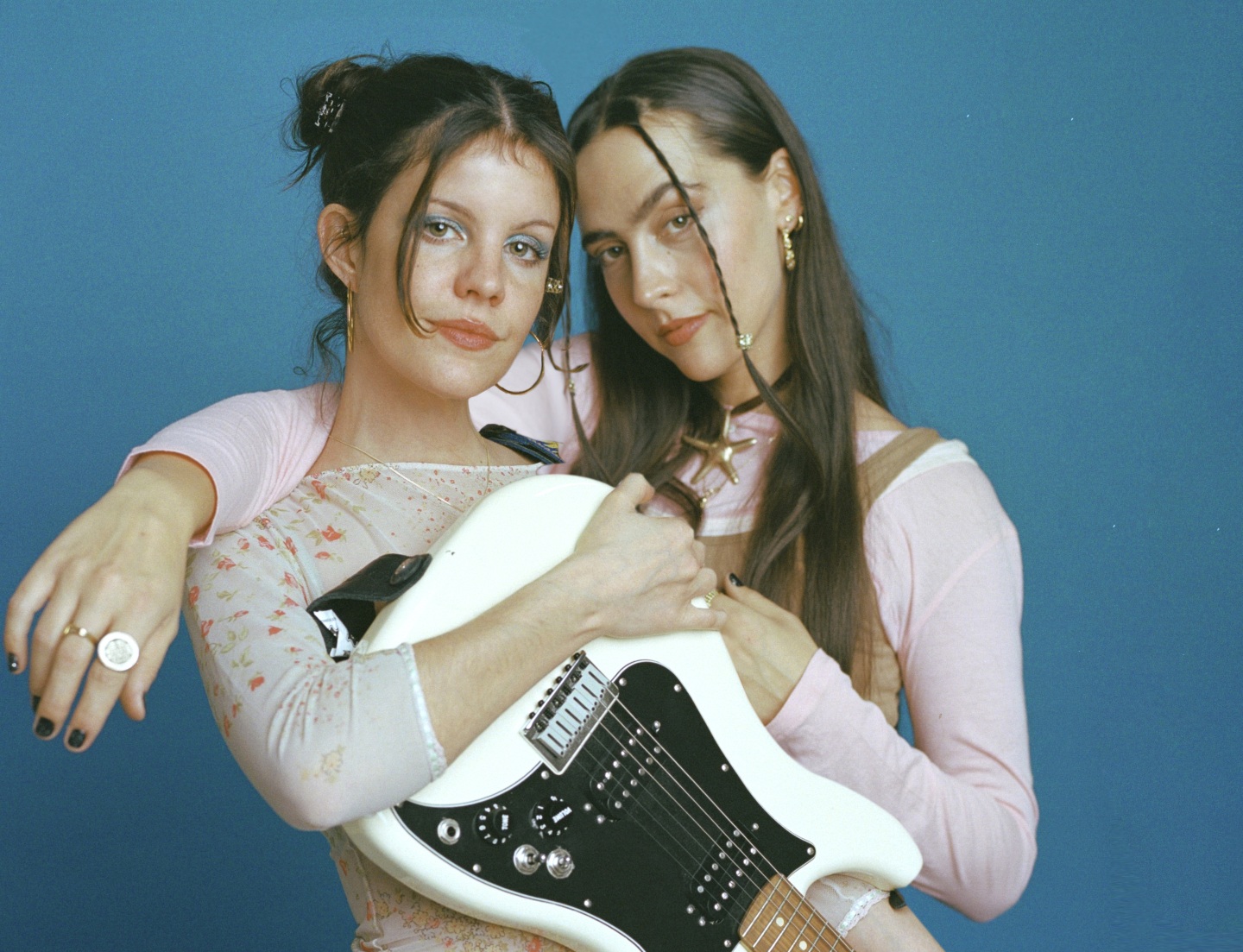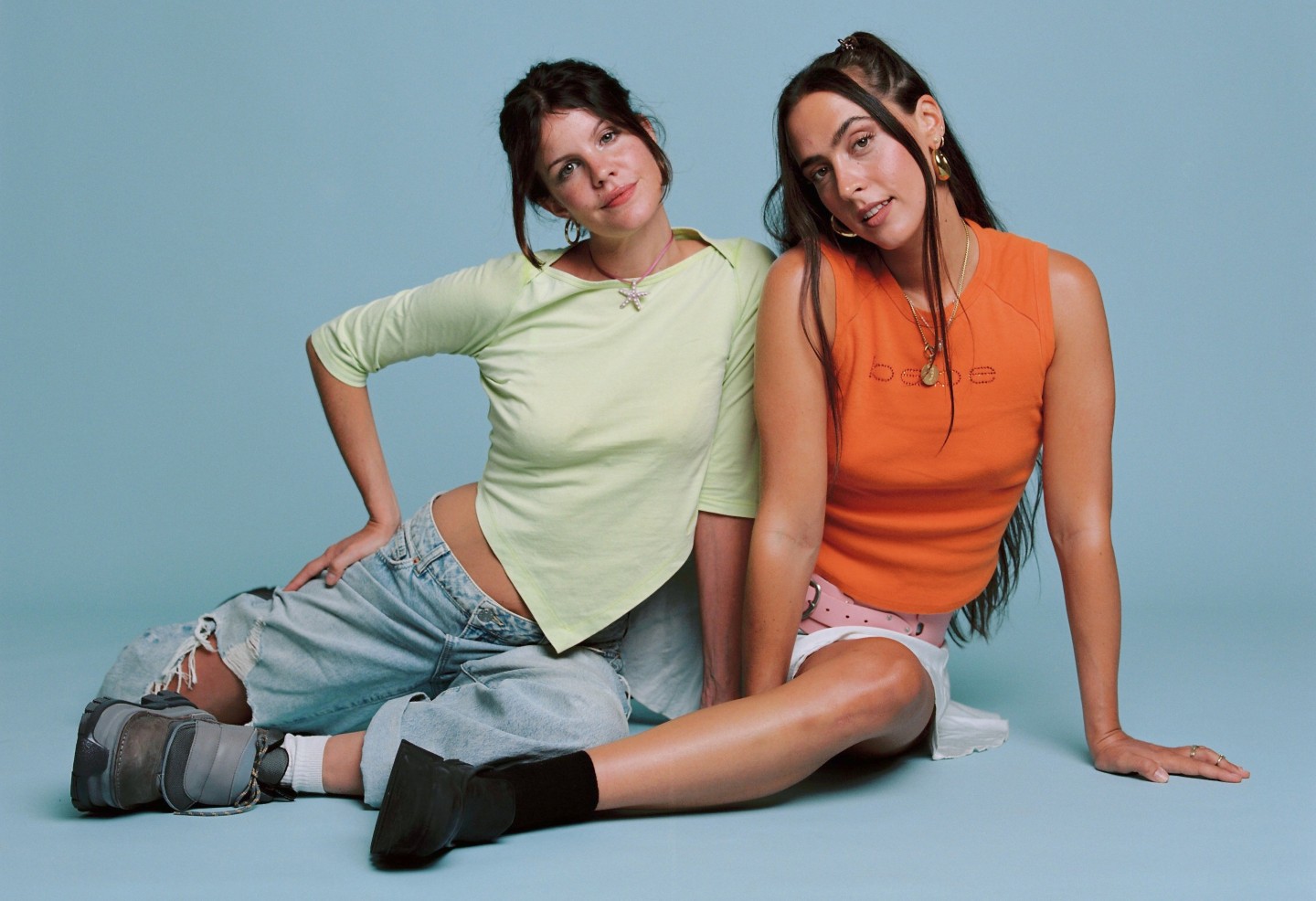 Hinds. Left: Carlotta Cosials. Right: Ana Perrote.
Dario Vazquez
Hinds. Left: Carlotta Cosials. Right: Ana Perrote.
Dario Vazquez
“We are broke,” Hinds’ Carlotta Cosials and Ana Perrote announced gleefully to the sold-out Baby’s All Right crowd earlier this year. “But we are millionaires in friendship!”
Cosials and Perrote’s friendship has always been central to the Madrid-based indie rock band. The two bonded over their shared love of slacker bands in 2011, and since then they’ve built a discography brimming with ramshackle, garage-pop charm. The first Hinds demos had Cosials and Perrote doubling up on instruments, since they didn’t have a bassist and drummer; once they finally fleshed out the full band, they went on to record three albums, support their idols The Strokes, and tour across the globe. Already heroes at home in Spain, it felt like they’d conquered the world.
But after touring their third album, The Prettiest Curse, in 2022, Hinds’ bassist, Ade Martin, and drummer, Amber Grimbergen, abruptly left. Now without a rhythm section, they also found themselves without management and a record label, after the pandemic devastated the music industry. Forget about a fourth album — they weren’t sure if they’d be able to continue as a band.
“Now, we finally can say that Hinds is not gonna be over,” says Cosials. “There were moments during these four years that we doubted it. And suddenly it’s like, WAH!!! Hinds! FOR LIFE!”
Enter VIVA HINDS!. It's an apt title for the band and their “never-say-die” attitude. It’s the first album Hinds are releasing without a permanent rhythm section, relying on producer Pete Robertson and producer/engineer Tom Roach to help realize their vision and bring it to life. VIVA HINDS! is the result of a band clawing their way back from the brink with their most adventurous album to date. It’s a signifier of their friendship, and their statement of intent to the world: Cosials and Perrote were never going to give up that easily. It’s also the first record to feature outside help: Grian Chatten of Fontaines D.C. appears on “Stranger,” while Beck contributes to “Boom Boom Back.” Cosials and Perrote write songs together, but from a singular perspective; the addition of other musicians add even more depth and perspective to the ever-evolving, ever-colorful, never boring world of Hinds.
I chatted to Cosials and Perrote a few days after their momentous NYC comeback shows earlier this spring about the catharsis of finally putting out a new record, what it takes to bring a band back from the brink, and friendship.
 Hinds.
Dario Vazquez
Hinds.
Dario Vazquez
The FADER: You’ve had a tough couple of years. What’s it been like to finally have new material, and to be playing it live?
Carlotta Cosials: The job of a musician is to do music and play shows. For four years, we weren’t able to do either of those things, because of the pandemic and our own circumstances. So suddenly, having an album and being able to share one song with the world… I felt like myself again, finally.
Ana Perrote: It’s weird to be a band without doing band things. We spent so much time trying to survive.
Was there a point where you thought that Hinds couldn’t continue?
CC: Yeah.
AP: Not because we didn’t want to, but, it was just one of those situations where it felt like if we were looking for a sign to stop being a band… we were getting so many signs.
CC: Everything kept going wrong.
AP: Anything that could go wrong, went wrong. Our castle of sand got demolished by life and circumstances. We never thought, “Should we keep going?” We always knew in our hearts that we wanted to keep going, but at some point… It felt like we were fighting the world to keep being a band.
I like what you said on stage, that you guys were broke in money but millionaires in friendship. One of my favorite things about watching you live is how clear your friendship is — you have so much fun on stage!
AP: Some people are just ashamed of having fun. Like, oh, I need to play it cool.
CC: I think it’s considered cool to not make an effort, or to not care. To be mysterious. Mystery has always been very attractive, I have to admit.
AP: If you don’t do music for fun, I don’t know what you’re doing. You’re not here for the money. You’re not here for the easy life. So you might as well have fun with it.
“We always knew in our hearts that we wanted to keep going, but at some point… It felt like we were fighting the world to keep being a band.”
How was recording an album when you were still unsure about the band’s future?
AP: I didn’t think we were going to be able to do this album. So my expectations were somewhere else, focusing on the sound, the music… [I had to convince myself] that these are good songs, that they were just a bit different than what we used to do. And now I love [the album], and I really understand that it had to be the album that it is. For me, it was more about accepting whatever [direction] we were going, rather than being like, okay, we’re going to have to do this kind of music for this kind of audience. And we were gonna make this album, however weird, sad, serious, or fun.
This was your first time heading into the studio without a full band.
AP: When we had a band, we could overthink everything before going to the studio. Some of the demos were more developed and we knew the vibe we were going for. Some songs we were completely lost [on].
You mentioned how you were skeptical about your song “Stranger.” Did you have to work hard to get the confidence to write about more difficult subjects?
AP: It’s what you were saying before, it couldn’t have happened if we weren't a couple of best friends. I really struggled, over the last couple of years, with my mental health. Obviously we talked about it as friends, but we hadn’t written about it. And we were in London writing songs. So we were like, “Okay, what do we write about?” And CC told me, why don’t we talk about what you’re going through, if it’s okay. She was super respectful. I’m really happy that happened, because I would’ve thought that this was too dark and too personal.
I would say a lot of the songs are maybe your darkest you’ve written.
CC: You get old and you get weird, right?
After the two members left, was that maybe the most difficult part in navigating the future of the band?
AP: It was the cherry on top. I don’t know if it was the hardest, but we thought that nothing could be worse.
What made you want to continue?
CC: I remember us looking at each other, and being like, of course. Not even a second of hesitation. Only you and me. We were like.... there’s an expression in Spanish. “You gotta put your sleeves up to do it.”
AP: We decided we were gonna carry on no matter what. We weren’t gonna wait for a record deal. We weren’t gonna wait for a manager. At some point we thought we might have to produce it ourselves, for €2,000 in a home studio.
CC: How can we make this happen for cheap, you know?
AP: Just as we decided to start working towards that plan, everything started falling into place. We found management in England. We found the girls. But I’m sure it happened because we didn’t wait for it to happen. You know what I mean?
“If you don’t do music for fun, I don’t know what you’re doing. You’re not here for the money. You’re not here for the easy life. So you might as well have fun with it.”
Did you say yes to playing the huge Coldplay shows without knowing who was going to play bass and drums?
AP: Of course! Our plan now is, we do it, and then we figure out how later. Because otherwise, things don’t happen.
CC: We wanted to take it slowly, like, let’s worry about the album now. And then worry about the live show later.
AP: To be fair, [Paula and Maria] are so good. Apart from actually being so talented, what I love is this attitude of fuck it, let’s do it and not be scared.
CC: This is their very first time in America. It’s so beautiful to live this dream with them, because it does feel like we are reliving the beginning somehow, you know?
It reminds me of when you two were first starting out, and both of you played the instruments on your first song, “Bamboo.” Ana played bass, and Carlotta played drums. It’s becoming a full-circle moment.
CC: Oh, shit. You’re so right.
AP: Seeing everything we have [achieved] through Paula and Maria’s perspective is so beautiful. Not that we take anything for granted, but we are used to being in New York, playing Baby’s. Being with someone where it’s their first time and being like, fuck. It is crazy that we are in New York, playing Baby’s!
“You get old and you get weird, right?”
What else do you look for in a bandmate?
AP: The first thing is being nice and being a good person. That goes for anyone — not just a bandmate, but a manager. Then, being girls. And then, being good musicians. Honestly, our bar wasn’t high. But they [Paula and Maria] are mind-blowing.
CC: To me, the lack of technique or knowledge is a matter of patience. But you cannot change the attitude. Having the will to improve, and to learn, is priceless.
I know you’ve already inspired a lot of women to play guitar, and start their own bands.
CC: We have to take over [the world]!
AP: The reason we didn’t start a band before is because we didn’t start playing soon enough. Because we didn’t see [women on stage]. Representation is huge. You see it, and you’re like, “I can do it too. It’s so important.” Even if a little girl sees us and she fucking hates it and she’s like, “Oh, they’re so shit, I’m gonna make a band better than them.” That’s fine! All of that is great, no matter what. Women on stage are gonna make a better world, and it’s gonna make more women in the crowd, and then on the stage. It’s a full circle.